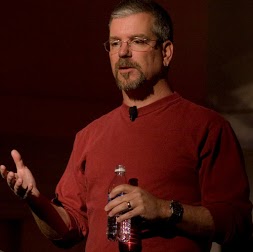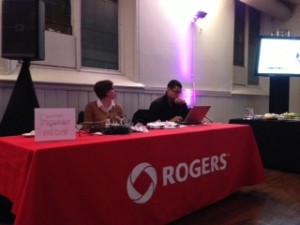The world of journalism and news media is dramatically different than it was five years ago. Today, digital media and traditional media simultaneously compete and feed one another as a new hybrid news ecosystem emerges. What is each best at? What are the strengths and weaknesses of traditional and digital media? What mistakes are being made? What lessons learned? And what are the factors we should be paying attention to as we try to understand what is driving news and business decisions today?
 Mathew Ingram is the embodiment of the revolution that is transforming journalism. He has experienced it first hand as he moved from traditional media as a technology writer and communities editor for Canada’s leading daily newspaper, the Globe and Mail, to become a senior writer with GigaOm, an early pioneering digital media outlet. And he is one of the co-founders of Mesh, the seminal digital conference that inspired Third Tuesday. Today, Mathew is a must-read for people who follow and care about the evolution of online media. And he does this from Toronto. Go Canada!
Mathew Ingram is the embodiment of the revolution that is transforming journalism. He has experienced it first hand as he moved from traditional media as a technology writer and communities editor for Canada’s leading daily newspaper, the Globe and Mail, to become a senior writer with GigaOm, an early pioneering digital media outlet. And he is one of the co-founders of Mesh, the seminal digital conference that inspired Third Tuesday. Today, Mathew is a must-read for people who follow and care about the evolution of online media. And he does this from Toronto. Go Canada!
What can people who come to see Mathew at Third Tuesday expect?
A few snippets to set the table:
On the use of crowd sourced content by news outlets
“By now, it should be obvious to just about anyone that “citizen journalism” or “user-generated content” is a crucial part of what the news has become, whether it’s a photo of a plane landing on the Hudson or a video of a bomb exploding in Boston. Unfortunately, the ways that media entities handle such content is all over the map — some give credit, while others take whatever they want without so much as a link. Do we need a formal structure to deal with this new reality?”
http://paidcontent.org/2013/05/24/crowdsourcing-the-news-do-we-need-a-public-license-for-citizen-journalism/
On the shifting economics of newspapers
“While prominent brands like the New York Times or those with targeted markets like the FT might be able to make the shift to subscriptions, many smaller newspapers simply won’t be able to make that transition, because they won’t have enough subscribers. So what happens to them? … there is a very real risk — not just for the NYT or Financial Times, but even more so for smaller newspapers — that relying on subscription revenue will result in a much smaller number of readers and also a much smaller business overall. What will that mean for the journalism that such newspapers produce? What happens to the public impact and social benefits that newspapers have always argued they bring to the table? Do newspapers just become a new variation on the controlled-circulation newsletter?”
http://gigaom.com/2012/08/03/crossing-the-newspaper-chasm-is-it-better-to-be-funded-by-readers
On one newspaper’s decision to shut down their paywall
“…research the newspaper did with print subscribers showed that what readers were willing to pay for wasn’t the actual content itself, but the method of delivery — that is, the printed newspaper. When offered the exact same content online for a price that was 90-percent less than the average print subscription rate, only five percent of readers said they were interested.”
http://paidcontent.org/2013/09/30/another-wall-tumbles-the-dallas-morning-news-dismantles-its-paywall-focuses-on-premium-content/
We pay for online entertainment. Why not news?
“…plenty of people are willing to pay for movies, TV shows and music, but a dramatically smaller number of them are willing to pay for news. Why? In part, because those other forms of content are, well… entertaining. News, in most cases, is not. Many consumers are more than happy to watch or listen to the same TV show, movie or song multiple times — something that almost never happens with a news story.”
http://paidcontent.org/2013/09/26/yes-some-people-will-pay-you-for-your-news-a-really-really-small-number-of-people/
Innovation: The upside of the deteriorating traditional business model for news
“Since no one really knows what the future of digital media looks like, it’s worth experimenting with as many new things as possible — in part because the next new thing always starts out looking like a toy.”
http://paidcontent.org/2013/09/23/theres-one-good-thing-about-the-newspaper-industry-decline-more-innovation-is-happening/
Social news distribution vs. RSS
“I still think RSS is a crucial part of the plumbing that underlies the web — and I hope the death of Google Reader isn’t the beginning of an attack on RSS, as some suspect — but for me it lacks a certain something, and that something is the element of social interaction. … social news distributed via Twitter and other networks is just that — social. It has a human element that automated RSS feeds simply can’t duplicate … it’s not just that Twitter is good at delivering real-time news — where it is, in my experience, as good or better than an RSS reader. It is also particularly good at attaching meaning to that news, by the combination of people who tweet or re-tweet a link or a piece of information. That does as much to help me appreciate the significance of a story as a single post or scoop, and likely more.”
http://gigaom.com/2013/03/15/why-the-death-of-google-reader-doesnt-bother-me-that-much-social-news-has-won/
On the value of Blog comments
“A blog without comments is a soap-box, plain and simple. Not having comments says you are only interested in passing on your wisdom, without testing it against any external source (at least not where others can watch you do so) or leaving open the opportunity to actually learn something from those who don’t have their own blogs, or aren’t on Twitter or Google+.”
http://gigaom.com/2012/01/04/yes-blog-comments-are-still-worth-the-effort/
On top of this, Mathew also authors a Twitter stream chock full of links to thought-provoking posts by others and his own reflections on them. It’s well worth following.
Now you can spend an evening with Mathew – at Third Tuesday
Registration for Third Tuesday with Mathew Ingram is open now. Register online to attend Third Tuesday Toronto #3TYYZ or Third Tuesday Ottawa #3TYOW.
Thank you to our sponsors
Third Tuesday is supported by great sponsors – Cision Canada and Rogers Communications – who believe in our community and help us to bring speakers not just to Toronto but to Ottawa, Calgary and Vancouver as well. Without the sponsors we couldn’t make Third Tuesday a truly Canadian affair. So, thank you to the sponsors of the Third Tuesday 2012-13 season: Cision Canada and Rogers Communications.
We want students to be able to attend
Third Tuesday is a great opportunity to hear about the latest developments in social media and to network with business and thought leaders. And we don’t want students to miss out on this opportunity. So, if you are a student and would like to attend, don’t let the admission fee stop you. Simply present your student ID card at the time you sign into Third Tuesday and we’ll refund your admission fee, courtesy of Thornley Fallis.







 Now Julien and Chris are back with a new book,
Now Julien and Chris are back with a new book, 
